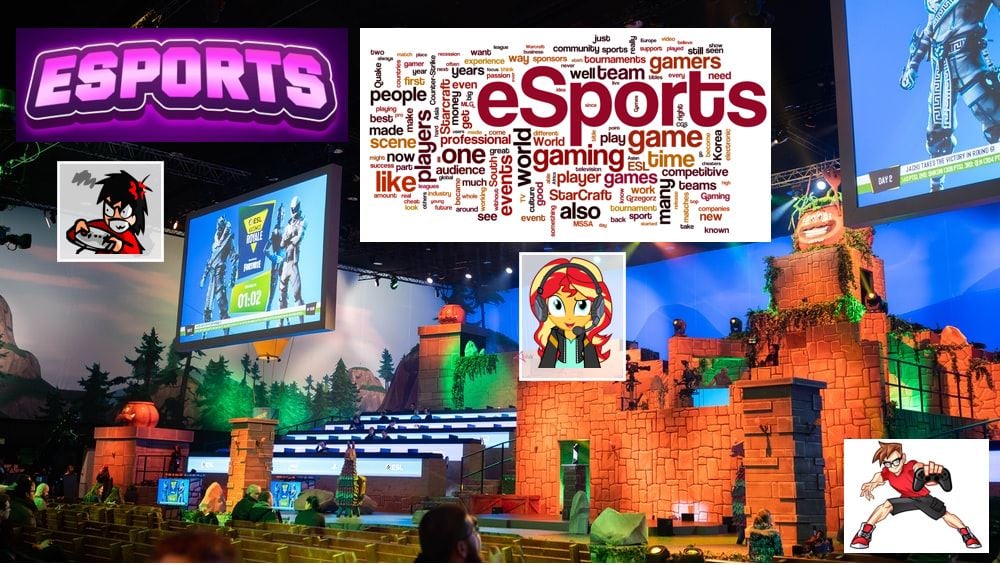The shortened form for Electronic Sports is eSports (UK/ˈiːˌspɔːts/ US/ˈiːˌspɔːrts). It can be written as esports or e-Sports. As with terms like e-Learning, e-Vehicle, and e-Mail, the initial ‘e’ stands for electronic. In the world of eSports, competitors play computer games in large arenas or online.
We can refer to the term in both the plural and singular, as in ‘What is esports?’ or ‘What are esports?’

In an eSports tournament in an arena, gamers compete against one another while fans watch the events on gigantic screens.
TechTerms.com has the following definition of the word:
“eSports (pronounced “e-sports”) is a general term used to describe video game competitions. Much like athletic sporting events, eSports games are often played before live audiences and may be broadcast over the Internet as well.”
eSports tournaments also harness cutting-edge streaming technologies, allowing millions worldwide to watch and engage with live competitive gaming events.
The eSports sector today is worth billions of dollars globally each year. Many players today have become multimillionaires. If you want to read about eSports matches, you will first need to become familiar with the vast number of jargon words that exist in this sector.
According to Hannah Dwan in an article in the Telegraph:
“There are prize pools of up to $24 million. Esports are also hard to understand, filled with jargon, and not exactly like the sports you typically associate with competition on a global scale.”

Individual and team-based competitions
In most cases, eSports tournaments are team-based. There are various leagues in which teams compete for positions in matches throughout the year, culminating in one giant, final event and a mega prize.
Some tournaments are global, while others are regional. In region-specific competitions, for example, European teams play only against other European teams, Asian teams against other Asian ones, etc.
Some matches consist of one-on-one, head-to-head matches, i.e., one person plays against another individual.
eSports has gained acclaim for its inclusivity, allowing individuals from diverse backgrounds to compete on a global stage regardless of their physical abilities.
Investment in eSports

Over the last few years, eSports has attracted a growing number of major investors due to its fast growth rate. Players, teams, and venues are now earning considerable sums from companies wanting to promote their brands.
-
Global esports market
According to Fortune Business Insights, the global esports market in 2022 was valued at $1.45 billion. It is predicted to grow to $6.75 billion by 2030.
Fortune Business Insights added:
“The growing trend of live streaming of games, gaming investments, rising viewership, ticket sales, engagement activity, and demand for league tournament infrastructure are the factors influencing the esports market growth. The market is benefiting from growing revenue opportunities from increased participation of gamers, organizers, influencers, and game developers.”
-
Worldwide audience
The global esports audience reached 574 million in 2023, of which – core enthusiasts constituted 283 million. With a compound annual growth rate of 8.1%, the global audience figure should reach 641.1 million by 2025, says ASO World.
- Top ten companies
Here are the top ten largest esports companies worldwide, according to ASO World:
- Tencent (China).
- Modern Times Group (Sweden).
- Activision Blizzard (US).
- Electronic Arts (US).
- Nintendo (Japan).
- Sony Interactive Entertainment (Japan).
- NetEase (China).
- Take-Two Interactive (US).
- GFinity (UK).
- FACEIT (UK).
“Esports” vocabulary and concepts
In the world of esports and gaming, there are several terms and expressions. Let’s look at some compound phrases that contain the word “esports,” understand their meanings, and see how they are used in a sentence:
-
Esports industry
The sector comprising all businesses and activities surrounding competitive gaming.
Example: “The esports industry is experiencing unprecedented growth, attracting sponsors from traditional sports and entertainment.”
-
Esports audience
The group of viewers who watch esports events, both online and in person.
Example: “The esports audience has expanded beyond gamers, drawing in viewers with various interests.”
-
Esports tournament
An organized competitive event where esports players or teams compete.
Example: “The annual international esports tournament drew competitors from over thirty countries.”
-
Esports revenue
The income generated from esports-related activities, including advertising, broadcasting rights, and merchandise.
Example: “Esports revenue has been steadily climbing, reflecting the activity’s surge in popularity.”
-
Esports coach
An individual who trains and provides strategies to esports players or teams.
Example: “The team’s performance improved significantly after they hired an experienced esports coach.”
-
Esports arena
A venue specifically designed for hosting esports events, often equipped with advanced technology and spectator facilities.
Example: “The new downtown esports arena can seat thousands of fans, making it one of the largest in the country.”
Video – What is esports?
This video presentation, from our sister channel on YouTube – Marketing Business Network, explains what the meaning of ‘ESPORTS’ is using simple and easy-to-understand language and examples.
